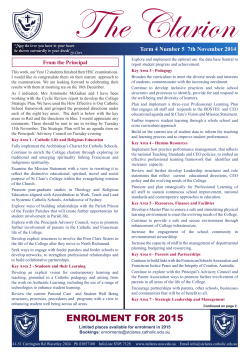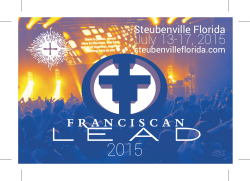
the dignity of work and the rights of workers
the dignity of work and the rights of workers COUNTRY SPOTLIGHT: ZAMBIA LESSON PLANS GRADES 1–8 CONTENTS The Dignity of Work and the Rights of Workers, and Catholic Relief Services Overview . . . . . . . 2 Joyce’s Story . . . . . . . . . . . . . . . . . 3 Lesson Plans and Activity Sheets Grades 1–3. . . . . . . . . . . . . . . . . 4 Grades 4–6. . . . . . . . . . . . . . . . 7 Grades 7–8. . . . . . . . . . . . . . . . 9 Photo by Ric Francis for CRS ©2015 Catholic Relief services. All Rights Reserved. US1592 background information for session leaders THE DIGNITY OF WORK AND THE RIGHTS OF WORKERS The Dignity of Work and the Rights of Workers is one of the seven principles of Catholic social teaching, as outlined by the United States Conference of Catholic Bishops, or USCCB. The beginning of the Catholic social tradition dates back to the Industrial Revolution. The development of machinery created unsafe conditions, a demand for longer work hours and child labor. In 1891 Pope Leo XIII wrote the encyclical “Rerum Novarium,” which emphasized the dignity of work and called for changes that would protect the rights of workers. The Church believes that work is important. It’s more than just a way to earn money—it’s a way to participate in God’s creation. Because the ability to work honors human dignity, the economy should serve people. This means that working conditions must respect the rights of workers. The rights of workers include “the right to productive work, to decent and fair wages, to the organization and joining of unions, to private property and to economic initiative.” (USCCB, Seven Themes of Catholic Social Teaching) Water irrigation furrows introduced by CRS are helping small-scale farmers produce more food. Photo by Jake Lyell for CRS CATHOLIC RELIEF SERVICES Catholic Relief Services is the official international humanitarian agency of the Catholic community in the United States. We are motivated by the example of Jesus Christ to assist poor and suffering people in more than 100 countries on the basis of need, without regard to race, religion or nationality. Founded in 1943, CRS reaches 85 million of the world’s poorest people each year with innovative solutions to poverty, hunger, drought, disease and emergencies. CRS works in close partnership with the Catholic Church around the world, and with local, national and international organizations that share our commitment to finding ways to meet immediate needs while empowering communities for the long term. CRS AND THE DIGNITY OF WORK AND THE RIGHTS OF WORKERS CRS’ microfinance programs in Zambia help poor people earn money to support their families and save for the future. Savings and Internal Lending Communities, or SILCs, provide loans that help members start small businesses to earn better incomes. This is a form of microfinance developed by CRS that targets poor people who don’t have access to formal financial services. Most SILC members are women. The SILC Road. Typically, 15 to 30 group members meet 2 to 4 times per month to deposit money in a collective fund. As the fund grows, the group provides small loans. Members can borrow money to develop small businesses. Some of the group’s savings also goes into a social fund that provides interest-free loans for emergencies, such as funerals or medical expenses, and for school fees. To learn more about our work with SILC communities, watch the CRS video “The SILC Road.” SILC promotes the Catholic social teaching principle the Dignity of Work and the Rights of Workers by establishing conditions that empower workers to enter into the marketplace and earn a living. the dignity of work and the rights of workers COUNTRY SPOTLIGHT: ZAMBIA ©2015 Catholic Relief services. All Rights Reserved. US1592 2 Joyce’s story TANZANIA DEMOCRATIC REPUBLIC OF THE CONGO Kasama MOZAMBIQUE Mansa Solwezi ANGOLA Kitwe Ndola Chipata Kabwe Mongu ZAMBIA NAMIBIA LUSAKA MALAWI MOZAMBIQUE ZIMBABWE BOTSWANA DEMOCRATIC NI OF T ED TA RE N Z PU B AN L IA I C U Lake Tanganyika Joyce Namate Malunda and her two daughters live in Mongu, Zambia. Life has always been hard for Joyce. She had a small farm, but couldn’t grow enough food to feed her family. And her small house wasn’t sturdy enough to keep out the wind and rain. Joyce’s life changed when she joined a Catholic Relief Services-supported community savings group in her village. People in the group have known and trusted each other for a long time. Like Joyce, many of them do not have very much money. The group saves what it can and contributes its savings to a common fund every 2 weeks. Group members can ask to borrow money from the fund, but have to pay back whatever they borrow. Joyce borrowed money to open a small grocery shop in the local market. She earned enough money to move her family into a better house. And now she can afford to buy good food and pay for her daughters to go to school. MALAWI Top: A Savings and Internal REPUBLIC Lending Community, or SILC, OF THE CONGO Kasama in Zambia helps members save money and offers loans to help Lake Mansa them start businesses or cover Malawi emergency expenses. Above ANGOLA Solwezi left: Zambia, located in Southern Africa, is surrounded by other Ndola Chipata African nations and does not Kabwe border any body of water. Mongu carryLusaka Below right: Women food MOZAMBIQUE distributed by CRS during a drought in Zambia. be Map credit: OCHA. Top Photo Livingstone byNAMIBIA Kim Pozniak/CRS. Bottom Photo by Richard Lord for CRS. Za m THE DIGNITY OF WORK AND THE RIGHTS OF WORKERS All people should be able to find work that honors their dignity, which includes ZIMBABWE being paid a fair wage and working in BOTSWANA 100 km safe conditions. The community savings Map Sources: ESRI, OCHA, UNCS. The boundaries and names shown and the designations used on this that map do notJoyce imply official belongs to honors the group endorsement or acceptance by the United Nations. Map created in Dec 2011. dignity of work and the rights of workers by giving them a chance to create their own jobs—like opening a grocery store—when they might not be able to find other work. zi the dignity of work and the rights of workers COUNTRY SPOTLIGHT: ZAMBIA ©2015 Catholic Relief services. All Rights Reserved. US1592 3 the dignity of work and the rights of workers COUNTRY SPOTLIGHT: ZAMBIA LESSON PLAN GRADES 1–3 40 Minutes OBJECTIVE ACTIVITY (20 MINUTES) Students will learn about the Catholic social teaching principle the Dignity of Work and the Rights of Workers (United States Conference of Catholic Bishops, Seven Themes of Catholic Social Teaching) through the story of Joyce Namate Malunda and a community savings group she joined through Catholic Relief Services. 1. Tell students that they will have the chance to design a worker’s dignity booklet. MATERIALS Cover: Students’ choice Page 2: Students’ personal interpretations of Joyce’s story Page 3: A picture students have drawn of themselves displaying one of their talents or doing the job they think they would like to do when they grow up Back: Illustration(s) for the prayer about the dignity of work that closes this lesson Coloring supplies Joyce’s Story Workers’ Dignity booklets, printed double-sided 2. Pass out the Workers’ Dignity booklets and coloring supplies. Encourage students to use illustrations and words in their booklets. Journals will include the following pages: World map DISCUSSION (15 MINUTES) 1. Share that students will learn about the Church’s teachings on the Dignity of Work and the Rights of Workers through the story of Joyce Namate Malunda, who lives in Zambia. 2. Locate Zambia on a map. 3.Read Joyce’s Story. 4. Ask students to brainstorm why it is important that Joyce has meaningful work. 5. Explain what the word “dignity” means. Say that we believe that all people should be able to find good work that honors their dignity, which includes being paid a fair wage and working in safe conditions. CLOSING PRAYER (5 MINUTES) Invite students to read together the prayer on the back of their journals. We pray for Joyce in Zambia, for our parents and for all people who work hard each day. As they work to earn enough for food, shelter, clothes and other things their families need, may they also celebrate the gifts and talents you have given them. Amen TAKING IT HOME Invite students to talk with their parents about the work they find most meaningful and why. the dignity of work and the rights of workers COUNTRY SPOTLIGHT: ZAMBIA ©2015 Catholic Relief services. All Rights Reserved. US1592 4 ZAMBIA ©2015 Catholic Relief services. All Rights Reserved. COUNTRY SPOTLIGHT: US1592 the dignity of work and the rights of workers Amen may they also celebrate the gifts and talents you have given them. and other things their families need, As they work to earn enough for food, shelter, clothes and for all people who work hard each day. for our families We pray for Joyce in Zambia, Loving God, prayer DESIGN THE COVER. COUNTRY SPOTLIGHT: ZAMBIA workers dignity booklet US1592 3 ©2015 Catholic Relief services. All Rights Reserved. US1592 ©2015 Catholic Relief services. All Rights Reserved. DRAW A PICTURE OF YOUR TALENTS OR WHAT YOU WANT TO DO WHEN YOU GROW UP. 2 DRAW A PICTURE OF JOYCE’S STORY. God blesses me with the talent to ... Joyce’s story the dignity of work and the rights of workers COUNTRY SPOTLIGHT: ZAMBIA LESSON PLAN GRADES 4–6 45 Minutes OBJECTIVE Students will learn about the Catholic social teaching principle the Dignity of Work and the Rights of Workers (United States Conference of Catholic Bishops, Seven Themes of Catholic Social Teaching) through the story of Joyce Namate Malunda and the community savings group she joined through Catholic Relief Services. MATERIALS Bible of the Dignity of Work and Copy the Rights of Workers Activity Sheet, Grades 4–6, one per group Four index cards per group Joyce’s Story Pens or pencils World map DISCUSSION (15 MINUTES) 1. Tell students that they will learn about the Church’s teaching on the Dignity of Work and the Rights of Workers through the story of Joyce Namate Malunda, who lives in Zambia. 2. Locate Zambia on a map. 3.Read Joyce’s Story. 4. Explain the Catholic social teaching principle the Dignity of Work and the Rights of Workers and discuss how it is reflected in the story. ACTIVITY (25 MINUTES) 1. Write the following on four index cards before the start of class: Card 2: Clothing Store—Startup loan: $200; Weekly income: $100; Loan payment: $20/week Card 3: Pet Shop—Startup loan: $300, Weekly income: $100; Loan payment: $30/week Card 4: Flower Shop—Startup loan: $100; Weekly income: $75; Loan payment: $10/week 2. Divide students into small groups. Give each group an index card with an assigned business and the Dignity of Work and the Rights of Workers Activity Sheet, Grades 4–6, to fill out. 3. Ask what challenges they faced as they thought through starting up the business. Share that there are many factors that make it difficult to find and keep work. Explain that the community savings model upholds the principle of the Dignity of Work and the Rights of Workers by giving people like Joyce the opportunity to create work that they might not otherwise find. CLOSING PRAYER (5 MINUTES) Read Matthew 20:1–16. Loving God, everyone deserves the dignity of work and has a right to fair pay. May we work to protect and ensure this right throughout the world. Amen TAKING IT HOME Invite students to pray with their families for all those around the world without fair work. Card 1: Grocery Store—Startup loan: $200; Weekly income: $150; Loan payment: $20/week the dignity of work and the rights of workers COUNTRY SPOTLIGHT: ZAMBIA ©2015 Catholic Relief services. All Rights Reserved. US1592 7 the dignity of work and the rights of workers COUNTRY SPOTLIGHT: ZAMBIA ACTIVITY SHEET GRADES 4–6 1. What kind of work does your business do? 2. Name your business. 3. What will you need to buy to start your business and how much will that subtract from your original loan? 4. After your business is open for 2 weeks, you have made $300. What will you do with the money? (Remember the importance of saving money so that you can restock your supplies and advertise your business to gain new customers!) the dignity of work and the rights of workers COUNTRY SPOTLIGHT: ZAMBIA ©2015 Catholic Relief services. All Rights Reserved. US1592 8 the dignity of work and the rights of workers COUNTRY SPOTLIGHT: ZAMBIA LESSON PLAN GRADES 7–8 45 Minutes OBJECTIVE ACTIVITY (30 MINUTES) Students will learn about the Catholic social teaching principle the Dignity of Work and the Rights of Workers (United States Conference of Catholic Bishops, Seven Themes of Catholic Social Teaching) through the story of Joyce Namate Malunda and the community savings group she joined through Catholic Relief Services. 1. Invite four students to create a skit using the character descriptions on the Dignity of Work and the Rights of Workers Activity Sheet, Grades 7–8. Assign each student a character and ask him or her to write a dialogue based on the instructions on the handout. MATERIALS The Dignity of Work and the Rights of Workers Activity Sheet, Grades 7–8, four copies Joyce’s Story Pens or pencils World map DISCUSSION (10 MINUTES) 1. Share that students will learn about the Church’s teaching on the Dignity of Work and the Rights of Workers through the story of Joyce Namate Malunda, who lives in Zambia. 2. Locate Zambia on a map. Read Joyce’s Story. 3. Explain the Catholic social teaching principle the Dignity of Work and the Rights of Workers and discuss how it is reflected in the story. 4. Ask students the following discussion questions: When you need to pay for something, what do you do? What do you do if the cost of what you want to buy is more than what you have? Have you ever borrowed money from someone? How did you pay it back? 2. Have other groups discuss what the Dignity of Work and the Rights of Workers means. 3. Ask the group that has created the skit to perform it in front of the class. Invite all the other groups to watch the skit and to reach a consensus about who should receive the loan and why. 4. Discuss the small groups’ decision. Ask: What did you take into consideration as you made your decision? How does the savings group reflect the Dignity of Work and the Rights of Workers? CLOSING PRAYER (5 MINUTES) God of Bounty, the gifts of your creation and the fruits of our labor sustain us. When we are able to share these gifts, more people live secure, productive and fulfilling lives. Open our minds to share our resources, goals and achievements with our brothers and sisters. Amen TAKING IT HOME Invite students to consider saving a little bit of money each week to donate to someone in need. the dignity of work and the rights of workers COUNTRY SPOTLIGHT: ZAMBIA ©2015 Catholic Relief services. All Rights Reserved. US1592 9 the dignity of work and the rights of workers COUNTRY SPOTLIGHT: ZAMBIA ACTIVITY SHEET GRADES 7–8 COMMUNITY SAVINGS GROUP DIALOGUE Group members Geraldine: age 35, married, mother of 3 boys (ages 4, 9 and 11) Geraldine owns a business that runs errands for people in the city. She and her sons take important messages and papers to people by bike. They have two bikes that need some repairs, and would use the money to fix them. Betty: age 20, unmarried, no children Betty hopes to become a full-time nurse at the local community clinic. She would use the loan to attend health education classes there. Kitana: age 67, recently widowed, mother of 5 grown children and grandmother of 12 Kitana cares for her adult daughter who is living with disabilities. She would use the money to take on additional work that would help cover the cost of her daughter’s medications and daily care. Mary: age 25, married, mother of an infant girl Mary’s husband travels for work, and she is concerned about her safety at night. She’d like to use the money to purchase a secure door and windows for their home. Scenario: Women make up the majority of community savings group members because they often don’t have access to loans or banks. Geraldine, Betty, Kitana and Mary are each making a case for a loan at their community savings group meeting. The members of the group have to decide whom to give the loan to. Based on the descriptions above, write a dialogue for your assigned group member that makes a case for why she should receive the loan. Betty: Kitana: Mary: Geraldine: the dignity of work and the rights of workers COUNTRY SPOTLIGHT: ZAMBIA ©2015 Catholic Relief services. All Rights Reserved. US1592 10
© Copyright 2025









